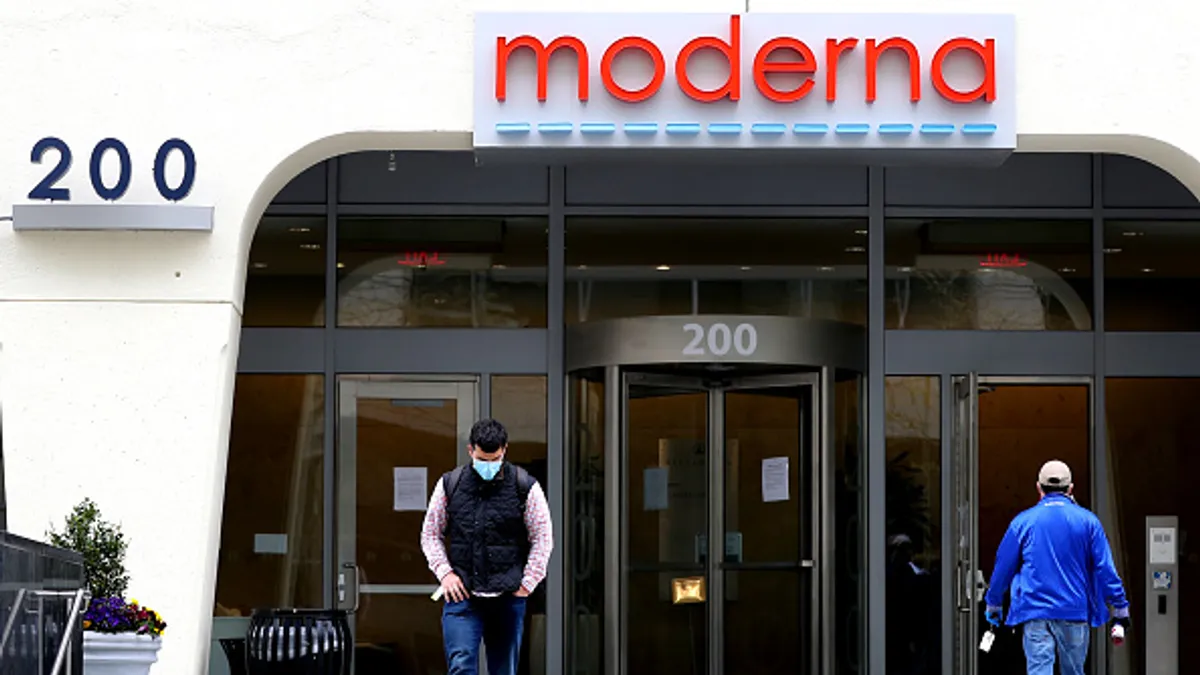Just over a week after being called back to replace his abruptly departed successor this month, Moderna CFO David Meline said hiring and scaling up pose big challenges as the vaccine maker seeks to keep its position as an industry leader.
“We’re still a very small company and so our main constraint to expand and continue to develop is really around the management bandwidth we have,” he said, adding even as the company’s success is enabling it to attract the best talent in the world there’s only so many people with the expertise it seeks. “That’s a high quality problem we’re trying to solve.”
The pressure stemming from the fast-paced transformation of the company from a pre-commercial firm to one with over 3,000 employees today and $5.9 billion in COVID-19 vaccine sales in the first quarter is one of a number of topics Meline touched on Friday in a wide-ranging keynote talk at the CFO Leadership Council’s 12th Annual CFO Leadership Conference.
But his comments on the war for talent that many companies have been battling are particularly notable coming in the wake of a high-profile hiring that tripped up Moderna.
Meline, a former Amgen CFO who joined Moderna as CFO in June 2020, was brought back within the week of his retirement this month to replace the ousted Jorge Gomez. Gomez departed Moderna within roughly 24 hours of taking the finance helm after Moderna learned of an ongoing internal probe into financial reporting at his former employer, Dentsply Sirona.
The unusually swift C-suite changes were briefly acknowledged with some humor during the talk by Meline, who said he wasn’t sure if his retirement from Moderna lasted one day or two. “My first retirement from Amgen was for 30 days, this one was for, actually I guess it depends on how you count, for one or two days,” Meline said.
Otherwise he did not directly address the recent CFO shuffle after he was asked during an open Q&A portion of his talk for hiring-related tips to avoid the kind of problems that “you banged into recently." He instead focused on the specific challenges of growing a company during a pandemic.
Meline said he felt it was important to make sure new hires, in addition to having the necessary skills and talent, also have the same priorities and are culturally aligned with the company. As part of that effort, Meline said job prospects at Moderna often are interviewed at much higher levels in the organization than might be expected in order to better assess the candidate. How effective that effort is in determining whether the person is a good fit may not yet be fully clear, he said.
“So far so good but I think it’s early days,” said Meline, who acknowledged that due to the pandemic during his first year at the company he did not meet his boss or any other employee. “As you have more on-site activities you really get to know how successful you are in building a culture and attracting talent.”
Meline also discussed the challenges of growing the company and building a supply chain and other operations that ensured rapid deployment of the vaccine. Moderna's success is a case study in the potential payoff from public-private cooperation, he said.
“I’m not big on drama but it’s pretty important and I think it’s really positive validation of the power of innovation,” he said. Asked if he had any tips for how CFOs can handle stress given that Moderna had faced many pressures with world leaders calling daily and focused on the vaccine, he said he found that “being calm is a pretty good trait to have in the role of CFO, especially in this circumstance.”














